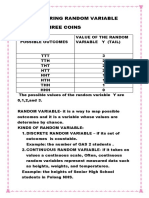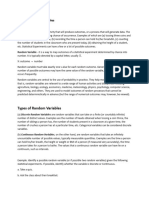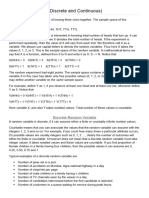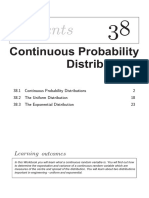0% found this document useful (0 votes)
53 views1 pageContinuous Random Variables
A continuous random variable can take on an infinite number of possible values over an interval rather than at specific points. It is represented by the area under a curve, with the probability of any single value being equal to 0. The probability that a continuous random variable is within a set of outcomes is defined as the area above that set of outcomes and under the density curve, which must have only positive values and have a total area of 1.
Uploaded by
Ramachandran MCopyright
© © All Rights Reserved
We take content rights seriously. If you suspect this is your content, claim it here.
Available Formats
Download as PDF, TXT or read online on Scribd
0% found this document useful (0 votes)
53 views1 pageContinuous Random Variables
A continuous random variable can take on an infinite number of possible values over an interval rather than at specific points. It is represented by the area under a curve, with the probability of any single value being equal to 0. The probability that a continuous random variable is within a set of outcomes is defined as the area above that set of outcomes and under the density curve, which must have only positive values and have a total area of 1.
Uploaded by
Ramachandran MCopyright
© © All Rights Reserved
We take content rights seriously. If you suspect this is your content, claim it here.
Available Formats
Download as PDF, TXT or read online on Scribd
/ 1

































































